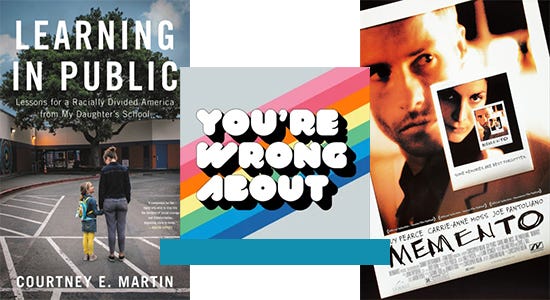Happy Memorial Day Weekend! The Mode/Switch Team is taking a break this weekend, as we hope you do, too. So, here’s a replay issue about an always timely experience.
The widespread shift to remote work has some experts asking how mentoring and training is supposed to happen. For Ed Citron in his piece in the Atlantic, helping people learn on the job has less to do with remote vs. in-person than with “investing uninterrupted, thoughtful energy in another person’s success.”
But what happens if you don’t have a manager who takes the time to offer you the training you need for your next new job?
Learning a new job can feel like sitting down to one of those rotating dinner tables tourists encounter in China with lots of delectable dishes circling by. I remember sitting down to a table like that, perhaps thirty feet in diameter, featuring everything from sea cucumber to stir-fried tofu to spicy soup to baijiu. Some things looked delectable. Some looked hard to swallow.
One thing was clear to me in the situation: no baijiu. I hadn’t slept the night before, so I needed stimulants, not depressants.
But then, the host began making his way around the table, toasting each guest in turn. Fearing that I wouldn’t be able to avoid the booze, I emptied my baiju pitcher into a little trough at the table’s edge. Then, taking a quick glance around, I quietly refilled the pitcher with water. Unfortunately, when the host arrived at my chair, he himself needed a refill. He topped off his glass with my pitcher and then, as everyone watched, toasted me and tossed back what he thought was good booze.
I don’t speak Mandarin. But let’s just say I had no trouble understanding what the host hissed next. He snapped his fingers to his servers to refill my pitcher, and I took my medicine.
The baijiu actually tasted fine. But the experience has become a parable for me of managers who don’t know what their people need or want.
In settings where your supervisor doesn’t offer the mentoring you require, you have no other option than gulping down what comes at you. I think Courtney Martin’s book would call this Learning in Public. For her, such learning happened when she took her daughter to school in a racially divided community.
For you, learning in public could happen in your next position.
I would love to promise that your next workplace will feature a rotating table of Peking duck and fried rice. More likely, you’ll find yourself at a committee table where you practice the art of Not Knowing Enough.
But Ben Hoekstra gave me a fuller picture of what it’s like to learn in public, as he described moving from nonprofit to corporate America. He had started out as a communication professional at the Milwaukee Rescue Mission. Then, he’d done some grad school, completing a masters in corporate communications at Marquette University. Today, he’s working as a Provider Public Affairs Manager at a large Midwest health company.
But mentoring hasn’t always been easily available for Ben. Like so many Gen-Zers, he runs a side hustle, a consultancy that offers marketing help for companies with small budgets. Running his own enterprise often means doing lots of learning in public.
Once, at a mix-and-mingle fundraising gala, he casually mentioned to a gala-goer that he was running a marketing consultancy. She responded that, hey, she knew a guy who needed consultancy. But as Ben made arrangements for the consult, he was puzzled about one thing: nobody would say what it was that this company exactly did. When Ben finally asked that blunt and slightly embarrassing question, he learned that the organization was a payday loan company.
I imagine Ben inhaling slowly for a hot minute wishing for a mentor to script his next move. He had worked long enough in the nonprofit world to know the impact of these agencies on everyday citizens, especially, as careful research makes clear, on Black and Brown citizens.
So, should he tell the client, “I don’t like what you do, so I can’t work with you”? But at their consultation, Ben was a little relieved to learn that the president was trying to run an ethical company. The gig still didn’t feel awesome, but, needing the client, Ben agreed to take on the humbling task of learning in public.
Now, Ben was faced with another question that all his previous training in communication hadn’t prepared him for: how do you design persuasive but principled payday-loan messaging that doesn’t endanger vulnerable clients or compromise your own resume?
As Ben switched modes back and forth, from Expert Consultant to Learner-in-Public, he gradually figured out how to design a website that was clear and candid without over-promising.
Don’t just look for an empty room with lots of coffee, Ben says, and hope you can figure it all out on your own. Try treating everyone, coworkers and clients alike, as potential teachers.
And here’s some good news. Learning in public is not just essential for you as an employee. It’s also good for your workplace community. After the 2016 presidential election, Ben found himself sitting one morning at a predominantly White committee table, where he heard coworkers speaking a little complacently about how they thought that maybe the election was, you know, no big deal. But Ben, having listened carefully to colleagues of color, was able to raise the point that maybe now wasn’t the best time to say, Hey, it’s all good. Instead, based on what he himself had learned in public, he was able to help his colleagues practice a little more humility and empathy in a complicated political moment.
When you start your next new position, it will feel like an intensely personal, maybe even lonely, education. But don’t lose sight that it’s also a collective project, rather like a rotating table full of good but hard-to-swallow entrees. The good news is that the learning that comes around to you goes around to others as well.
Who’s Saying Good Stuff
Courtney E. Martin’s book Learning in Public
Sarah Marshall’s pod You’re Wrong About
Christopher Nolan’s film Memento
Each of these conversations—a book, a pod, and a film—don’t just talk about learning public, they dramatize what it looks and lives like. If the practice of imitation is not just mimicking, but rather watching how someone else makes moves in complex situations, well then, these are good people to imitate. Just maybe not everything that Guy Pearce does in Memento.
X’s and Zs: An Intergenerational Glossary
Here’s an edited transcript of a follow-up call to Ben on the Mode/Switch.
Craig: So, I need to get to the really important stuff now. As a Gen X guy, I need to know what dank means.
Ben: When you hear the word, what’s the first thing in your mind?
Craig: A basement. Dark and musty. Not really a place I want to be.
Ben: Actually, it means like it's, it's really cool, it's original. Like, That's a dank meme.
Craig: Alright, so here's another one: glow up.
Ben: What’s your first thought?
Craig: It rhymes with grow up so I'm struggling with that.
Ben: There's this trend going around on Facebook right now, and other social media where you share your 10-year photo, right? And if that's a good change, it was a glow up.
Craig: OK, one more: cheugy. I'm just having a hard time putting that in any sentence.
Ben: It’s like something that's really cringey. It's a next generation from the term basic. When you walk through Target, and they have that one section where everything is labeled with the name of where the thing goes, like, Laundry, Kitchen. That’s cheugy.
Craig: Really enjoying the fact that the transcriber on Microsoft Teams thinks we’re saying 2G, not chuegy. Anyway, thanks for this. Can I say it was a dank interview?
Ben: We'll be in touch.
Thanks for reading. Have a great holiday - and see you next week! - Craig





